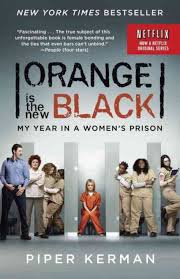What’s In Style These Days
Stuck in an airport because of flight delays – an all too common experience – what to do? WiFi and work, of course, and there’s almost always miles and miles of shopping. Embracing the concept, Philadelphia’s airport is more mall than travel hub. But what if you don’t want to shop? Or if the carry on is full and that special something from Brookstone would need a bag check and an additional fee? The standby is reading a book.
Recently “trapped” in O’Hare I searched for a terminal and airplane read. My bias is against hardcover and popular fiction. What remains is non-fiction, business, and staff recommendations as my shelves of choice. With bad weather and the zeitgeist in cahoots at O’Hare, I felt oddly compelled to read Piper Kerman’s Orange is the New Black. A book and a Netflix series, this prison memoir is resonating in our collective cultural landscape. When in Rome . . . .
The plot and outline are well-known: upper middle class Smith graduate, Kerman hangs out with the wrong older crowd after graduation. She travels to Europe, becomes a money courier for a drug ring – almost accidentally in her memoir – then wises up and gets her life in order. All things seem fine until the police knock on her door years later and she is convicted as part of a larger government investigation. Kerman spends 13 months in a federal prison – not maximum security – and recounts her experience in this breezily written first hand account.
At pains to distinguish her situation from those of her fellow inmates, who are poorer, usually African-American or Hispanic, Kerman uses her position of privilege to do an almost-ethnography of life behind bars. She reads, she writes, she runs, and she learns about herself and other women in prison. She is also very fortunate. Her family and boyfriend are steadfastly supportive and there is the likelihood of a positive life after incarceration. Kerman regularly reminds us that she is well aware of her good fortune and her culpability. It is an easy read, without much reflection or difficult questions. I thought of “Life in a Chain Gang” light with yoga. Kerman knows that her experience was not “real prison.”
Even as I zipped through the pages from my own place of privilege in wide-body jets and shopping malls disguised as airports, Orange is the New Black annoyed me. Kerman’s account has been criticized for its upper-middle class white perspective, but that did not trouble me. We are who we are. It was only after Philip Seymour Hoffman’s death – and my own memories of people that I have known whose lives have been ruined or ended because of drug addiction – that my disappointment with Kerman came into focus. She admits – up front – responsibility for her actions. She also, briefly, seems to realize that her contributions to the drug trade may have caused others harm. But through the text there is no real appreciation of that, no real sense of ownership. She is sorry but not remorseful.
Kerman has monetized her experience extraordinarily effectively. The very same traits that allowed her to navigate a terrible experience so successfully – her focus on herself and her lack of interest in reflection – helped put her in prison in the first place. With success, however, comes an expectation of responsibility, or at least something more. Orange is the New Black is an interesting but not a thoughtful book. Absent is the state of grace that can accompany true contrition.
David Potash
